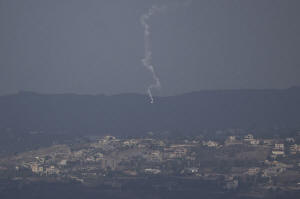Israel says halting Hezbollah attacks is now a war goal as officials
warn of a wider operation
 Send a link to a friend
Send a link to a friend
 [September 17, 2024]
By JOSEF FEDERMAN and JULIA FRANKEL [September 17, 2024]
By JOSEF FEDERMAN and JULIA FRANKEL
JERUSALEM (AP) — Israel said Tuesday that halting Hezbollah's attacks in
the country's north to allow residents to return to their homes is now
an official war goal, as it considers a wider military operation in
Lebanon that could ignite an all-out conflict.
Israeli officials have repeatedly threatened to take heavier military
action to halt the near-daily attacks, which began shortly after the
outbreak of the nearly yearlong Israel-Hamas war in Gaza. Israel has
regularly launched airstrikes on Lebanon in response and has targeted
and killed senior Hezbollah commanders.
As recently as last month it appeared a full-blown war was imminent.
Tuesday's statement by Israel's security Cabinet signaled a tougher
stance at a time when Israeli leaders have stepped up their warnings.
But it also appeared to be largely symbolic and may not herald an
immediate change in policy.
The tit-for-tat strikes have displaced tens of thousands of people on
both sides of the Israeli-Lebanon border. Hezbollah has said it would
halt the attacks if there is a cease-fire in Gaza, but those talks have
repeatedly bogged down.
The United States has pressed for restraint even as it has rushed
military aid to Israel, warning its close ally that a wider war would
not achieve its goals.

Israeli media have meanwhile reported that Prime Minister Benjamin
Netanyahu is considering firing Defense Minister Yoav Gallant and
replacing him with Gideon Saar, the leader of a small right-wing party
who is seen as more hawkish. That would be the biggest leadership
shakeup in Israel since Hamas' Oct. 7 attack triggered the war in Gaza
and set off wider regional tensions.
The announcement on Lebanon came after Israel's security Cabinet met
late into the night. It said the Cabinet has “updated the objectives of
the war" to include safely returning the residents of the north to their
homes.
“Israel will continue to act to implement this objective,” it said.
U.S. envoy Amos Hochstein, who has made several visits to Lebanon and
Israel to try to ease tensions, met with Netanyahu on Monday.
Hochstein told Netanyahu that intensifying the conflict with Hezbollah
would not help return Israelis evacuated from the border area to their
homes, according to a U.S. official, who spoke on condition of anonymity
to discuss the private talks.
According to the official, Hochstein argued that Netanyahu risked
sparking a broad and protracted regional conflict if he moved forward
with a full-scale war in Lebanon and said the Biden administration
remained committed to finding a diplomatic solution in conjunction with
a Gaza cease-fire or on its own.
Netanyahu told Hochstein that residents cannot return without “a
fundamental change in the security situation in the north,” according to
a statement from the prime minister's office. It said that while
Netanyahu “appreciates and respects" U.S. support, Israel will “do what
is necessary to safeguard its security."

[to top of second column]
|

An Israeli army flare is seen over the Israeli-Lebanese border as
seen from the Israeli-annexed Golan Heights, Monday, Sept. 16, 2024.
(AP Photo/Leo Correa)
 Defense Minister Gallant has meanwhile said the
focus of the conflict is shifting from Gaza to Israel's north. He
told U.S. Defense Secretary Lloyd Austin this week that time is
running out for an agreement with Hezbollah, saying “the trajectory
is clear.”
Hezbollah has said that while it does not want a wider war it is
prepared for one.
Raed Berro, a member of Hezbollah’s bloc in the Lebanese parliament,
said Monday that the militant group “is ready for confrontation and
has a lot in its pocket to deter the enemy and protect Lebanon in
case Netanyahu thinks of expanding the war.”
Lebanese Parliament Speaker Nabih Berri, a close political ally of
Hezbollah, largely dismissed the warnings, telling a local newspaper
that the Lebanese have grown used to the “increasing Israeli threats
… even if their tone has become louder recently.”
The war in Gaza began when Hamas launched a surprise attack into
southern Israel, killing some 1,200 people and taking another 250
hostage. Militants are still holding around 100 captives, a third of
whom are believed to be dead, after releasing most of the rest
during a cease-fire last year.
Israel's retaliatory offensive has killed over 41,000 Palestinians
in the territory since Oct. 7, according to Gaza's Health Ministry.
The ministry does not differentiate between fighters and civilians
in its count but says a little over half of those killed were women
and children.
Iran supports Hamas, Hezbollah and other militant groups across the
region, which have carried out strikes on Israeli and U.S. targets
in solidarity with the Palestinians. A missile launched by Yemen's
Iran-backed Houthi rebels on Sunday set off air raid sirens in
central Israel without causing casualties. Israel has hinted at a
military response.

Israel and Iran traded fire directly for the first time in April,
and Iran has threatened to avenge the killing of Hamas leader Ismail
Haniyeh in an explosion in Tehran in July. The targeted killing was
widely blamed on Israel, which has not said whether it was involved.
The U.S., Qatar and Egypt have spent most of this year trying to
broker an agreement in which Hamas would release the hostages in
exchange for a lasting cease-fire, a full Israeli withdrawal from
Gaza and the release of Palestinians imprisoned by Israel.
President Joe Biden endorsed the framework of the agreement in May
and the U.N. Security Council backed it days later. But since then,
both Israel and Hamas have accused each other of making new and
unacceptable demands, and the talks appear to be at an impasse.
___
Associated Press writers Aamer Madhani in Washington, and Abby
Sewell and Kareem Chehayeb in Beirut contributed to this report.
All contents © copyright 2024 Associated Press. All rights reserved |